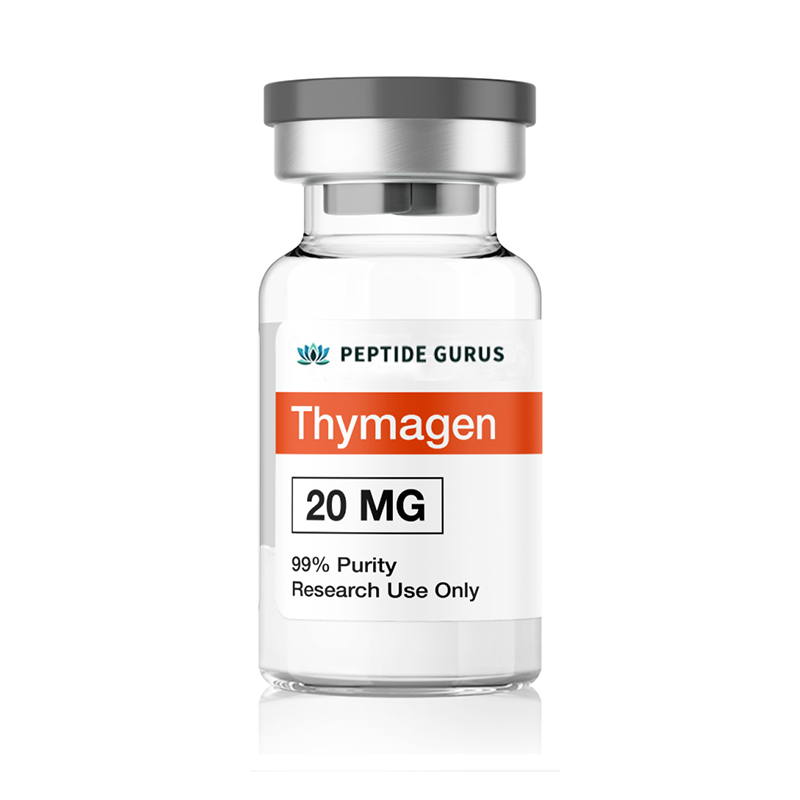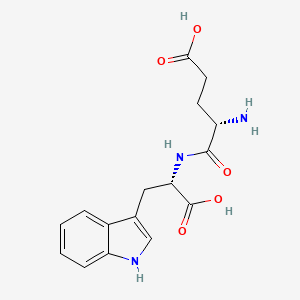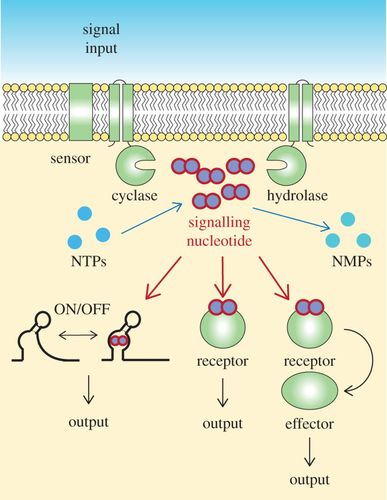



Categorias:Biorreguladores peptídicos, Produto acabado de peptídeo, Peptídeos e suas dosagens
Grátis (1) 30 ml de água bacteriostática
com ordens qualificadas sobreUS $ 500 USD.
(Exclui produtos de cápsula, peptídeos cosméticos, códigos promocionais e remessa)
O timageno (timogênio) é um peptídeo biorreator altamente ativo com efeitos primários nas células do sistema imunológico. Foi demonstrado que aumenta a produção e a diferenciação de células T, estimula a secreção de interferons, aumentam os níveis de nucleotídeos cíclicos e promovem a funcionalidade do sistema imunológico inato. Como resultado de seus efeitos no sistema imunológico inato, também demonstrou -se que os timagenos ajudam a prevenir o câncer e reduzir a gravidade da doença. A pesquisa mostrou que o timageno é útil como medidas preventivas perioperatórias contra a infecção. Foi demonstrado que aumenta a taxa de recuperação após a cirurgia e também é potencialmente cardioprotetor.
Uso do produto:Este produto é destinado apenas a um produto químico de pesquisa.Essa designação permite o uso de produtos químicos de pesquisa estritamente para testes in vitro e apenas experimentação laboratorial. Todas as informações do produto disponíveis neste site são apenas para fins educacionais. A introdução corporal de qualquer tipo em seres humanos ou animais é estritamente proibida por lei. Este produto deve ser tratado apenas por profissionais qualificados e licenciados. Este produto não é um medicamento, alimento ou cosmético e pode não ser de marca mal, mal utilizada ou incorreta como droga, comida ou cosmético.
O timageno (timogênio) é um biorregulador de dipeptídeos com efeitos primários no timo e no sistema imunológico. Originalmente isolado do timo de bezerro, o timageno agora é produzido por meio de técnicas de DNA recombinante. Na Rússia, o timageno foi estudado por sua capacidade de tratar o câncer, regulando a resposta imune inata do corpo. Também demonstrou promessa em doenças cardíacas, diabetes e como tratamento pós-operatório para melhorar os resultados cirúrgicos. A pesquisa mostra que pode estimular a resposta imune a vários vírus e uma variedade de infecções bacterianas. Ele mostrou sucesso no tratamento da hepatite B e C.
Sequência de aminoácidos:Glu-Trp (EW)
Fórmula Molecular:C16H19N3O5Peso molecular: 333.34 g/mol
PubChem CID: 100094
CAS Number: 38101-59-6
Synonyms: Oglufanide, Thymogen

Cyclic nucleotides are single-phosphate nucleotides with a cyclic bond arrangement between the sugar and phosphate groups. They are integral components of communication within cells, usually acting as second messengers within the cell after a protein on the cell surface has bound to something. In other words, cyclic nucleotides act as messengers within cells for substances that cannot enter the cells themselves.
Research on Thymagen shows that it down regulates cyclic nucleotide catabolism. In other words, Thymagen slows the breakdown of cyclic nucleotides and thereby raises their levels within the cell[1]. This results in enhanced ability of cells, particularly those of the immune system, to respond to messages from other parts of the body. For example, increased levels of cyclic nucleotides could make cells of the immune system more responsive to invading pathogens by improving signaling between these cells.
Summary of nucleoside signaling (nucleotides indicated as NTPs being converted to NMPs). Thymagen has been shown to increase the pool of NTPs and potentiate down-stream effects:

The effects of Thymagen on the immune system begin, but don’t end at cyclic nucleotides though. Research in rat spleen and thymus has shown that Thymagen promotes the maturation of T-lymphoctye precursors into immunocompetent T-cells capable of fending off disease. This process of maturation is driven by the changes that Thymagen induces in cyclic GMP (cGMP) levels[2]. By optimizing cyclic nucleotide ratios, Thymagen helps to ensure that T-lymphocyte precursors are getting the signals that tell them they need to mature into full-flow cells of the immune system.
Thymagen, along with other immunomodulatory molecules like Immunitor and Milife, has also been shown to induce interferon secretion[3]. Interferons are signaling proteins made by host cells in response to viral infection. They serve to modulate and coordinate immune defenses against viruses, but have also been shown to ward off cancer and are generally known as immune regulators. Interferons are used currently in the treatment of autoimmune diseases, such as multiple sclerosis, and in combination with chemotherapy and radiation in the treatment of certain cancers. They are also used in the treatment of both hepatitis B and C.
Inflammation is a process that is primarily controlled by the immune system. It therefore stands to reason that a substance capable of influencing the immune system might have an impact on inflammation as well. This turns out to be solid reasoning where Thymagen is concerned. Research shows that Thymagen helps to normalize lymphocyte counts and increase T-Cell functional activity. This leads to a desensitizing effect that down-regulates inflammation by reducing pro-inflammatory cytokine levels.
Speaking specifically of the ability of Thymagen to affect the immune response to invading pathogens was a study carried out in guinea pigs infected with Yersinia enterocoliticia (a bacteria related to the bacteria that causes the Plague). The guinea pigs treated with Thymagen in this study showed increased nonspecific resistance to the bacteria as well as an increased specific humoral (antibody) response. Thymagen appeared to help regulate the immune response by focusing it on natural killer cell immunity and by helping to prevent autoimmune reactions. The overall result was to decrease the dissemination of Y. enterocoliticia and ultimately to aid in its elimination from the body[4].
Research shows that patients with type 1 diabetes are suffering from secondary immunodeficiency in many cases. Thymagen, by promoting T-Cell differentiation, removes signs of this immunodeficiency and helps to correct the deficit. In fact, a clinical effect was seen in nearly 95% of patients in the study[5].
Diabetes actually leads to immunocompromise if left untreated. One of the primary results of this is infection with candida (yeast) species. These types of infection are notoriously difficult to treat and can lead to serious morbidity in people with diabetes. Research with Thymagen indicates that it can slow candidiasis in the setting of secondary immunodeficiency and give existing treatments and edge in eradicating the fungus[6].
Infections following surgery and not uncommon, particularly for abdominal surgery and for individuals with immunodeficiency. While the elderly are not considered to be immunodeficient, they are more susceptible to infection following surgery as a result of reduced immune function. Research with Thymagen reveals that administering the peptide for a week prior to surgery reduces both the number of varieties of post-operative complications. The peptide also appears to reduce the postoperative period by hastening recovery and return to normal activity[7].
Thymagen has been studied as a possible treatment for several different heart conditions. The earliest research looked at the ability of Thymagen to reduce arrhythmia using 6 different models of the disease condition. Research showed a beneficial effect, including a solid dose-response curve that indicated that the observed changes were in fact legitimate[8].
Thymagen has also been studied in isolated heart models where it has been found to have superior protective properties compared to commonly used drugs like verapamil[9]. In the setting of cardiac ischemia, protecting heart muscle from further damage is one of the primary goals of treatment prior to restoration of blood flow via catheterization, bypass grafting, or clot dissolution. Treatment with cardioprotective drugs can help to prevent long-term consequences like heart failure or the need for transplant. Thus, Thymagen may be a useful adjuvant in treating ischemic cardiac injury.
Research in rats shows that radiation-induced carcinogenesis can be inhibited by Thymagen. In fact, all carcinogenesis is inhibited by Thymagen, with rats exposed to radiation living roughly average lifespans while rats with no radiation exposure live above average lifespans[10]. This suggests that Thymagen may be a useful cancer preventative, helping to ward off the disease even in the setting of unknown exposures.
According to Dr. Vladimir Anisimov, a collaborator of Dr. Vladimir Khavinson and an expert in cancer development, rats treated with Thymagen have been shown to have a decreased incidence of GI cancer. In fact, regardless of immune status in the study, the rats treated with Thymagen had a 12% reduction in tumor incidence as well as a 1.7-fold reduction in the number of tumors if they did develop cancer[11]. In other words, Thymagen appears to boost immune function against cancer. This suggests that Thymagen works to boost the body’s natural killer cell defenses, which are the front line against cancer, along with other aspects of the innate immune system. This helps to not only prevent cancer from developing, but reduces the rate and severity of spread in rats that do develop cancer.
Thymagen is a highly active peptide with primary effects on cells of the immune system. It has been shown to increase production and differentiation of T cells, stimulate the secretion of interferons, boost levels of cyclic nucleotides, and promote the functionality of the innate immune system. As a result of its effects on the innate immune system, Thymagen has also been shown to both help prevent cancer and reduce the severity of the disease.
There is good evidence that Thymagen is useful as a peri-operative preventative measures against infection. It has been shown to increase rate of recovery following surgery and is potentially cardioprotective as well.
The above literature was researched, edited and organized by Dr. E. Logan, M.D. Dr. E. Logan holds a doctorate degree from Case Western Reserve University School of Medicine and a B.S. in molecular biology.

Prof. Vladimir Khavinson is being referenced as one of the leading scientists involved in the research and development of Thymagen. In no way is this doctor/scientist endorsing or advocating the purchase, sale, or use of this product for any reason. There is no affiliation or relationship, implied or otherwise, between
ALL ARTICLES AND PRODUCT INFORMATION PROVIDED ON THIS WEBSITE ARE FOR INFORMATONAL AND EDUCATIONAL PURPOSES ONLY.
The products offered on this website are furnished for in-vitro studies only. In-vitro studies (Latin: in glass) are performed outside of the body. These products are not medicines or drugs and have not been approved by the FDA to prevent, treat or cure any medical condition, ailment or disease. Bodily introduction of any kind into humans or animals is strictly forbidden by law.
PeptideGurus is a leading supplier of American-made research peptides, offering top-quality products at competitive prices. With a focus on excellence and customer service, they ensure a secure and convenient ordering process with global shipping.
CONTACT